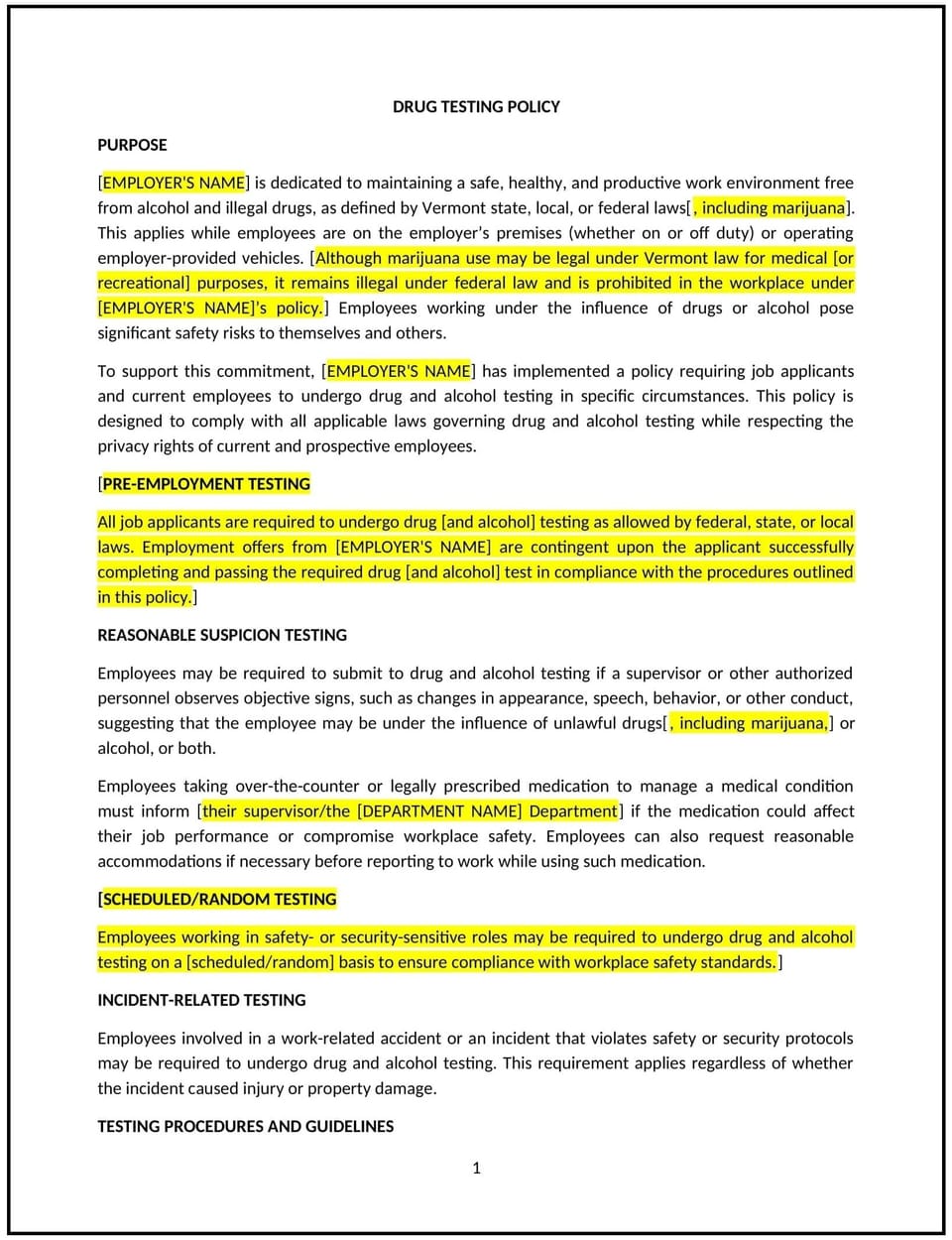Drug testing policy (Vermont): Free template

Drug testing policy (Vermont)
This drug testing policy is designed to help Vermont businesses promote a safe and productive workplace by outlining guidelines for conducting drug tests. It strengthens compliance with Vermont state laws while respecting employee rights and privacy.
By adopting this policy, businesses can maintain workplace safety, enhance productivity, and mitigate risks associated with drug use.
How to use this drug testing policy (Vermont)
- Define scope: Specify the types of drug testing covered, such as pre-employment, random, post-accident, or reasonable suspicion testing.
- Include legal compliance: Ensure the policy aligns with Vermont laws regulating drug testing, including notification and consent requirements.
- Detail testing procedures: Outline how tests will be conducted, including the collection, handling, and analysis of samples.
- Address confidentiality: Emphasize that drug test results will be handled confidentially and shared only with authorized personnel.
- Specify consequences: Clearly state the actions taken if an employee tests positive, such as referrals to assistance programs, suspension, or termination.
- Provide accommodations: Include provisions for employees using prescribed medications or medical cannabis in compliance with Vermont law.
- Monitor compliance: Regularly review testing practices to ensure they align with Vermont regulations and workplace needs.
Benefits of using this drug testing policy (Vermont)
This policy provides several benefits for Vermont businesses:
- Promotes safety: Reduces risks associated with impaired performance in the workplace.
- Supports compliance: Aligns with Vermont laws governing drug testing and employee rights.
- Enhances productivity: Helps maintain a focused and efficient workforce.
- Protects privacy: Establishes clear guidelines for confidential handling of test results.
- Provides clarity: Sets expectations for employees regarding drug testing procedures and consequences.
Tips for using this drug testing policy (Vermont)
- Communicate the policy: Share the policy with employees during onboarding and include it in the employee handbook.
- Provide training: Educate managers on recognizing signs of impairment and implementing testing procedures.
- Use certified labs: Ensure tests are conducted by licensed and reputable laboratories to guarantee accuracy.
- Offer assistance: Provide access to employee assistance programs (EAPs) for employees who need support with substance use issues.
- Update regularly: Revise the policy to reflect changes in Vermont laws, workplace dynamics, or industry standards.
Q: What types of drug testing are covered under this policy?
A: This policy includes pre-employment, random, post-accident, and reasonable suspicion drug testing, as outlined in the policy.
Q: How does the company ensure compliance with Vermont laws?
A: The company follows Vermont regulations by obtaining employee consent, maintaining confidentiality, and adhering to permissible testing practices.
Q: What happens if an employee tests positive for drugs?
A: Employees who test positive may face consequences such as referrals to assistance programs, suspension, or termination, depending on the circumstances and company policy.
Q: Are medical cannabis users subject to this policy?
A: Employees using medical cannabis must provide documentation of their prescription, and accommodations will be made in compliance with Vermont law.
Q: Are test results kept confidential?
A: Yes, all drug test results are handled confidentially and shared only with authorized personnel on a need-to-know basis.
Q: How are random drug tests conducted?
A: Random tests are conducted using a neutral selection process to ensure fairness and impartiality.
Q: How often is this policy reviewed?
A: This policy is reviewed annually or whenever significant changes occur in Vermont laws or workplace practices.
Q: Are employees offered support for substance use issues?
A: Yes, employees may access support through employee assistance programs (EAPs) or other company resources.
This article contains general legal information and does not contain legal advice. Cobrief is not a law firm or a substitute for an attorney or law firm. The law is complex and changes often. For legal advice, please ask a lawyer.


